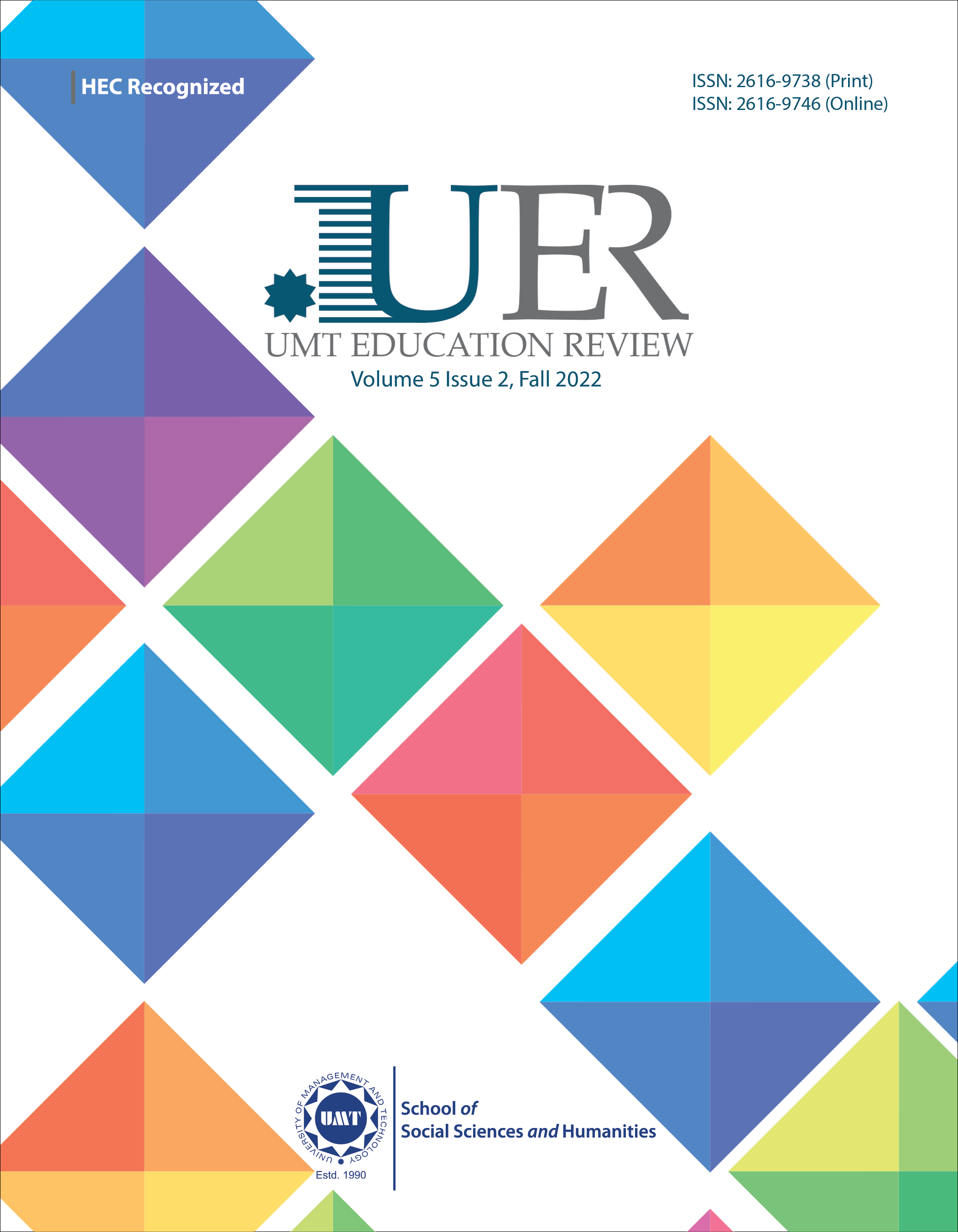Investigating the Relationship between Parental Punishment and Academic Achievement: A Case Study of Secondary Level Students in Sargodha, Pakistan
Abstract
 Abstract Views: 145
Abstract Views: 145
The current study explored the link of parental punishment with academic achievement of secondary school students. The sample size of 400 students (200 male and 200 female) was conveniently selected from both the private and the public secondary schools of tehsil Sargodha. A self-developed questionnaire was used to collect data. The collected data were analyzed through descriptive statistics. Major findings included that the majority of the students were physically punished. Whereas, some students were psychologically and emotionally punished by their parents. The results showed that parental punishment causes low academic achievement among students. The current study recommended that parents should not punish their children as it ultimately lowers their academic performance outcomes. This practice of parental punishment may be discouraged by guiding the parents in parent-teacher meetings.
Downloads
References
Abbasi, W. (2017, August 16). Harmful effects of spanking a toddler can trigger bad behavior — Even 10 years later. USA Today. https://www.usatoday.com/story/news/2017/08/16/...spanking.../562203001/
Barnow, S., Lucht, M. &Freyberger, H. (2001). Influence of punishment, emotional; rejection, child abuse, and broken home on aggression in adolescence: An examination of aggressive adolescents in Germany. Psychopathology, 34(4), 167-173. https://doi.org/10.1159/000049302
Brassard, M. R. (2001). Understanding the Six Forms of Emotional Child Abuse: Oliver Tuthill, Jr.;(25 Minute Video), produced by Autumn Tree Productions, distributed by Aquarius Health Care Videos, 5 Powderhouse Lane, PO Box 1159, Shervorn, MA 01770. Child Abuse & Neglect, 3(25), 429-430.
Moylan, C. A., Herrenkohl, T. I., Sousa, C., Tajima, E. A., Herrenkohl, R. C., & Russo, M. J. (2010). The effects of child abuse and exposure to domestic violence on adolescent internalizing and externalizing behavior problems. Journal of Family Violence, 25(1), 53-63. https://doi.org/10.1007/s10896-009-9269-9
Christensen, S, L. & Cleary, M. (1990). Consultation and the parent-education partnership: A perspective. Journal of Education and Psychological Consulation,1(3), 219-241. https://doi.org/10.1207/s1532768xjepc0103_2
Curran, K., Eisenstein, J., DuCette, J., Hyman, I., Ateah, C., & Bringiotti, M. (2001). Statistical analysis of the cross-cultural data: The third year. Symposium `conducted at the Annual Convention of the American Psychological Association, San Francisco, Calif.
Erickson, M. F., & Egeland, B. (2002). Child neglect. In J. E. B. Myers, L. Berliner, J. Briere, C. T. Hendrix, C. Jenny, & T. A. Reid (Eds.), The APSAC handbook on child maltreatment (pp. 3–20). Sage Publications, Inc.
Gershoff, E. T. (2002). Corporal Punishment by Parents and Associated Child Behaviors and Experiences: A Meta-Analytic and Theoretical Review. Psychological Bulletin, 128 (4), 539–579. https://doi.org/10.1037/0033-2909.128.4.539
Gershoff, E. T. (2010). More harm than good: A summary of scientific research on the intended and unintended effects of corporal punishment on children. Law and Contemporary Problems, 73(2), 31-56.
Hart, S. N., Durrant, J., Newell, P., & Power, F. C. (2005). Eliminating Corporal Punishment: The way forward to constructive child discipline. UNESCO.
Hickmon, M. (2008). Paddling vs. ACT scores and civil immunity legislation. http://www.stophitting.com/index.php?page=paddlingvsact
Lansford, J. E., Tapanya, S., & Oburu, P. O. (2010). Social violence: Corporal punishment. Encyclopaedia on Early Childhood Development. https://www.child-encyclopedia.com/pdf/expert/social-violence/according-experts/corporal-punishment
Lenta, P. (2017). Is Corporal Punishment Torturous? Journal of Applied Philosophy, 34(1), 74-88. https://doi.org/10.1111/japp.12134
Ipsos MORI. (2007). A study into the views of parents on the physical punishment of children for the Department for Children, Schools and Families (DCSF). Ipsos MORI. https://dera.ioe.ac.uk/6886/8/Section%2058%20Parental%20Survey.pdf
Mulvaney, M. K., & Mebert, C. J. (2010). Stress appraisal and attitudes towards corporal punishment as intervening processes between corporal punishment and subsequent mental health. Journal of Family Violence, 25(4), 401-412. https://doi.org/10.1007/s10896-009-9301-0
O’Connor, T. G., & Scott, S. B. C. (2007). Parenting and outcomes for children. Kings College London.
Oteri, I. O., & Oteri, O. M. (2018). Effects of Corporal Punishment on Academic Attainment of Secondary School Students. International Journal of Innovative Education Research, 6(2), 125-134.
Pinheiro, P, S. (2006). World report on violence against children. United Nations Secretary General’s study on violence against children. United Nations. https://violenceagainstchildren.un.org/sites/violenceagainstchildren.un.org/files/document_files/world_report_on_violence_against_children.pdf
Rizvi, S. F. I., & Najam, N. (2014). Parental psychological abuse toward children and mental health problems in adolescence. Pakistan Journal of Medical Sciences, 30(2), 256-260.
Straus, M. A. (1998). Corporal punishment of children and adult depression and suicidal ideation. In J. McCord. (Ed.), Coercion and Punishment in Long-Term Perspectives (pp. 59-77). Cambridge University press.
Turner, H. A., & Muller, P. A. (2004). Long-term effects of child corporal punishment on depressive symptoms in young adults: Potential moderators and mediators. Journal of Family Issues, 25(6), 761-782. https://doi.org/10.1177/0192513X03258313
Twum-Danso Imoh, A. (2013). Children’s perceptions of physical punishment in Ghana and the implications for children’s rights. Childhood, 20(4), 472-486. https://doi.org/10.1177/0907568212471404
United Nations International Children's Emergency Fund (2010). Child disciplinary practices at home: Evidence from a range of low-and middle-income countries. UNICEF. https://data.unicef.org/resources/child-disciplinary-practices-at-home-evidence-from-a-range-of-low-and-middle-income-countries/

This work is licensed under a Creative Commons Attribution 4.0 International License.
UER follows an open-access publishing policy and full text of all published articles is available free, immediately upon publication of an issue. The journal’s contents are published and distributed under the terms of the Creative Commons Attribution 4.0 International (CC-BY 4.0) license. Thus, the work submitted to the journal implies that it is original, unpublished work of the authors (neither published previously nor accepted/under consideration for publication elsewhere). On acceptance of a manuscript for publication, a corresponding author on the behalf of all co-authors of the manuscript will sign and submit a completed Copyright and Author Consent Form.
Copyright (c) The Authors










